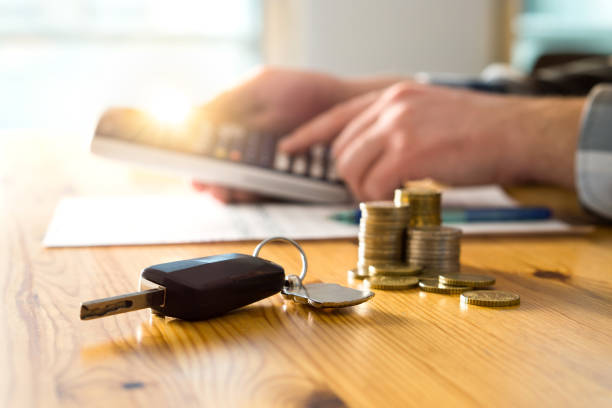Should I Sell My Car To Pay Off Debt?

If you're wallowing in debts with no hope in sight, it's normal to entertain the thoughts of selling your car or other type of asset to pay off debt.
But the question is, "Is it a good financial decision to sell my car to pay off debt". The answer to this question differs from person to person.
This article analyzes your financial situation (every possible financial situation) and provides a "Yes or No" answer. So if you're struggling to make a decision, read on.
Should I Sell My Car To Pay Off Debt?

Selling your car to pay off debts is a good decision to make if the cash obtained from selling the car is more beneficial than keeping the car. However, before you make the big decision to sell or not to sell your car, there are certain questions you have to answer.
Questions To Ask Before Selling Your Car
Your answer to the below questions can help you make the right decision on whether to sell your car.
1. How Much Is Your Car Worth?
This isn't a simple question. It comes with tons of layers. Before you provide an answer, consider the monetary worth of your car and the convenience and comfort it brings you.
If you're selling your car, can the money relieve you of all your debt? Or is it a temporary solution to your problem?
Side Note: Kelly Blue Book and Edmunds are online tools that can provide you with the appropriate monetary value of your car.
2. How Much Do You Spend On Gas, Maintenance, Repair, And Insurance
As a car owner, it's impossible to escape gas and repair expenses. Once you sum up these expenses, the amount can be shocking.
Take a moment to calculate how much you spend on your car's gas, repair, insurance, and maintenance. If your budget can accommodate it with ease, then your car may not be worth selling since it does not pose a threat to your finances. However, if your car's expenses cost an arm and a leg, it might be worth selling off to pay off debts.
3. Do You Still Owe Money On The Car Loan
If you still have a car loan to pay off, selling the car to pay off other debts may be a bad idea.
For it to be a good idea, the money earned from selling the car must be able to cover the existing car loan and the other debts you need to pay off.
Get a statement of your car loan's interest rate and the remaining amount to be paid off. If your car's worth is less than the interest plus payoff amount, do not sell your car.
If you end up selling your car under the above situation, you'll have to dig into your savings to pay off the remaining loan amount.

4. Will The Debt Grow Again?
What kind of debt do you owe? Are there chances it will grow again once you pay it off?
Most people make the mistake of selling an asset to pay off a debt that can never go away. Do not make the mistake!
If you sell off your car to pay off a debt. What will you do if you end up if you fall into the same debt again? Will you sell off other assets?
Another Interesting Article: How to Pay Off Debt and Travel the World
5. Are You Ready To Give Up Your Car?
The cost of owning and maintaining a car is no doubt expensive. However, have you considered the cost of not owning a car?
If you live in a city with high-quality public transportation, giving up your car may be a good idea. But if there is no adequate public transportation, selling off your car may be a disadvantage to you.
You know yourself better. Are you ready to give up the comfort and convenience of owning a car? If yes, then go ahead and sell off your car.
6. Can You Afford Another Car
If you sell off your car to pay a debt, can you afford to get a new car once your debt is fully paid off? Can the money gotten from selling the car get you a cheaper car?
If you'll still have to take out a loan to get a new car, do not sell your current car.
Should I Sell My House To Pay Off Debt?

The idea of selling your house to pay off debt should not be taken lightly. This decision can lead to severe consequences in the future.
If you're bent on selling your house, here are questions you need to consider:
-
How much does it cost to sell my house?
-
Is my house worth more than the amount I owe?
-
Am I prepared to move out of my house?
-
How much is the cost of rent?
-
Will I have to take another loan to buy a new house?
-
Are my financial struggles short-term or long-term?
-
Will the debt grow back after paying off?
-
Is my house in a sellable condition?
-
Why am I even in debt?
Before you entertain the thoughts of selling your house, look at the current housing market in your city, capital gain tax, and the economic situation. If the benefits of selling your house outweigh the disadvantages, then sell it.
However, it is important to note that selling your house to pay off your debts can make it harder for you to qualify for another mortgage.
10 Easy Ways To Pay Off Debts
Before you resort to selling properties to pay off debts, here are ten tips to follow that can help you pay off your debts without having to sell a car, or a house.
1. Create a Budget
Do not understand the importance of a budget. A realistic budget gives you an understanding of your financial situation and helps you point out areas where you can cut down on spending, thereby helping you to convert your excessive spending into savings - these savings can be put towards debt repayment.
Another Interesting Article: 17 Painful Consequences Of Not Budgeting
2. Focus On Debts With Higher Interest Rates
Debt avalanche is a debt repayment strategy that involves paying off debts with the highest interest rate. While you focus on paying off all your debts, put more focus on higher debts.
Once you pay off higher interest debts, you'll be free from bad debt. Hence, it'll be easier to save money.
3. Utilize Balance Transfer
A balance transfer is the act of moving a debt with high interest to another card with lower or zero APR. This enables you to successfully avoid paying interest rates on a debt.
4. Pay Off the Smallest Debts First
This is another debt repayment strategy called the snowball Method. This method focuses on paying off smaller debts first and then climbing up to focus on higher debts.
Using this method motivates you to continue your debt repayment journey.
Another Interesting Article: The Debt Snowball Method Explained: A Quick-Start Guide
5. Pay More Than The Minimum Balance
For example, if your monthly debt payment is $1000, make it a habit to pay extra. This strengthens your credit score and clears off your debts faster.
6. Use A Budgeting or Debt Replacement App
If you can't manually plan your budget, you can use apps like Mint, PocketGuard, YNAB, and EveryDollar. These apps provide advanced features that can help you plan your financial life better.
For debt repayment apps, use Qoins, Mint, Debt Manager, or Tally. Once you input your information and goals, these apps will create a detailed plan on how to help you get rid of the debt.
Another Interesting Article: 8 Debt Payoff Apps
7. Find A Side Hustle
The larger the size of your income, the larger the amount you can put towards savings or debt payments.
There are tons of flexible side hustles that can earn you big money. Some of them include freelance writing, graphics design, web development, transcription, and more.
8. Remove Your Credit Information From Online Stores
Shopping online with a credit card can lead to overspending. To prevent yourself from spending more than your budget, it is recommended to remove your credit information from all online stores.
9. Consolidate Your Debt
Debt consolidation is when you combine all your outstanding debts into a single account. It is the process of taking out a single loan to pay off all your other debts.
When you consolidate your debts, you can enjoy lower monthly debt payments and increase your credit score.
10. Request A Lower Interest Rate From Your Creditor
If you have a good repayment record, you can request a lower interest rate from your creditor. If this request is successful, it will greatly reduce the amount you put towards debt repayment. Thus, you can be debt-free in no time.
Final Thoughts
If you cannot manage your debts properly, you will be trapped in its endless cycle. So selling a car or house is only a temporary solution if you do not quit habits that lead you into debt.
Frequently Asked Questions On Debts
Is It Better To Pay Off Debts Or Invest?
It depends. If you're earning more in profits from investment than what your interest rate costs you, then you should invest. However, if the percentage of your interest rate is high, you should consider paying off the debts first. Overall, it is important to strike a balance between the two options.
Will Unpaid Debts Go Away?
No, unpaid debts can not go away until you pay them off. However, if it's a student loan, debt forgiveness can make part of the debt go away.
At What Age Should I Be Debt Free?
Anyone can go into debt at any age if they live a bad financial life, so there's no age to be debt free. However, most financial experts suggest that you should be debt free around your 50s to avoid paying off debts after retirement.
https://paypant.com/should-i-sell-my-car-to-pay-off-debt/
Comments
Post a Comment